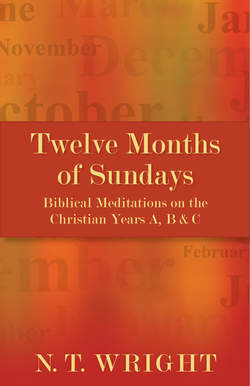Читать книгу Twelve Months of Sundays - N.T. Wright - Страница 40
На сайте Литреса книга снята с продажи.
ОглавлениеThe Sixth Sunday of Easter
Acts 17.22–31
1 Peter 3.13–22
John 14.15–21
In a spectacular (and presumably heavily abbreviated) speech, Paul takes on culturally sophisticated Athens with the new upside-down wisdom. He begins on their own territory, with the altar to the Unknown God: even the Athenians had left a window open, a gap in their well-worked-out theology, where fresh air could blow in from an unexpected quarter. Some of the poets, too, had pointed towards a God who was both other than the world and yet intimately involved with it.
Yet Paul is not simply finding points in the local culture he can affirm, as though Christian mission simply pats people on the back for being as they are. Affirmation is more than balanced by confrontation. Even today, if you stand on Mars Hill, where the highest court of the city used to meet, you have a wonderful view of the Acropolis, with the Parthenon and the other temples clearly in view, the pinnacle of a culture and its theology. Paul, against that backdrop, tells them it’s all a waste of time: the creator of all doesn’t live in houses like that. Nor does he need the whole paraphernalia of the sacrificial system. Nor – despite what not only traditional Athenians but also the pre-Christian Paul would have said – does he make any ultimate distinctions between one race of humans and another. Paul may have found an open window in the culture, but what’s blowing through it is a hurricane that will turn the room upside down.
In particular, Paul takes on the Epicureans and Stoics with whom he’d been debating in the marketplace. Epicureans, like Deists, thought of the gods as remote and detached, happily unconcerned about our world. Stoics, like some other pantheists, thought of God as the inner divine essence within our world. Both can lead, and sometimes do, to atheism (the gods are either so distant that they might as well not exist, or they turn out to be simply a metaphorical projection of our feelings of wonder) or at least to relativism (the gods are so far away that all religions are just vague approximations; or they are so present that all religions are different expressions of ‘the divine’). Both are confronted head on by Paul’s message of one God, the creator, who is both different from the world and compassionately involved with it. Both, in particular, are confronted, as is all atheism and relativism, by the fact of Jesus’ resurrection, and the message which it brings: the God of Israel is the one true God, who is bringing to the world the justice for which it longs.
Paul knew, as did Peter, how unwelcome this announcement would be. Yet the consequent suffering of Christians is itself to be part of the witness, because the justice proceeds from self-giving love. And the witness itself, as John would remind us, proceeds from the Spirit, God’s wind blowing fresh spring air through whatever windows, in whatever culture, may happen to be open.
